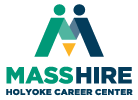
RECOVERY: IT’S GOOD FOR BUSINESS
Over 70% of people with SUD are employed. That’s about 15 million Americans!
Work is one of the best predictors of positive outcomes for people with SUD. People in recovery who are able to work have:
- Lower rates of recurrence of SUD
- Higher rates of abstinence from drugs and alcohol
- Less criminal justice involvement
- Fewer parole violations (for those with involvement with the criminal justice system)
- Improvements in quality of life
- More successful transitions from treatment back into the community
Nearly every business in America is affected by SUD. Yet only 17% of employers feel well-prepared to deal with it. But putting in the work is well worth the effort! Recovery Ready Workplaces enjoy many financial and professional benefits.
Are You Interested in Becoming a Recovery Ready Workplace?
Questions?
Contact Ramona
413-427-3498
rreno@masshireholyoke.org

